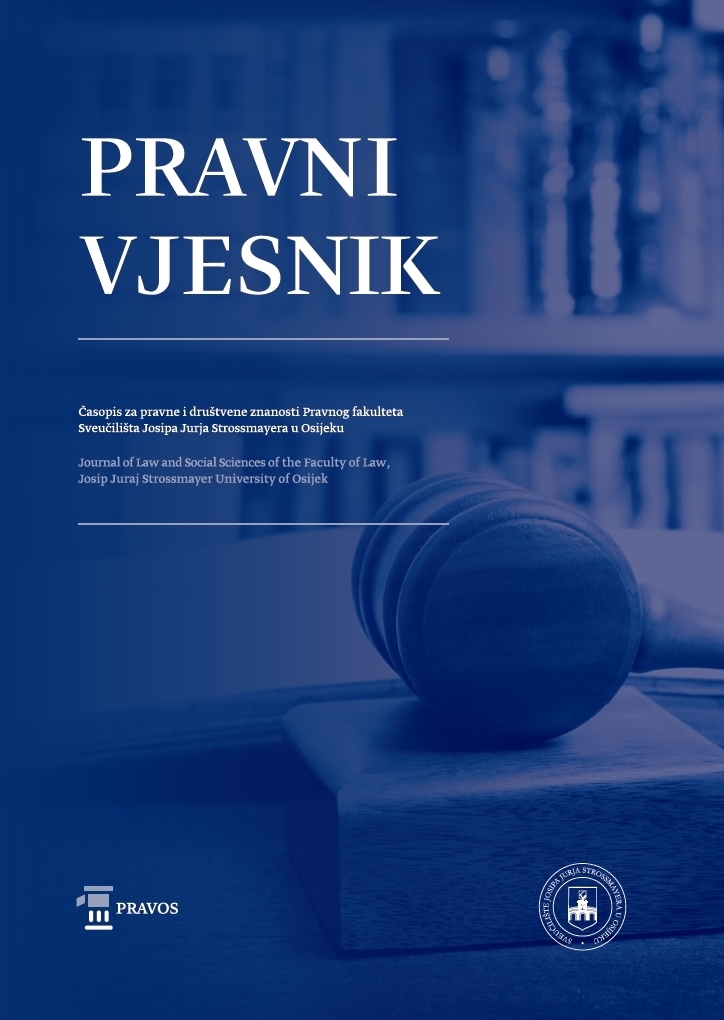SETTLEMENT AS A UNIQUE INSTITUTE OF CONTRACT LAW
DOI:
https://doi.org/10.25234/pv/24326Keywords:
settlement, settlement agreement, (out of) court settlement, material and court settlement, dispute, uncertainty, mutual concessionAbstract
For a long time the settlement was considered a “separate” institute of contract law in Croatian and comparative legal theory. Some authors considered it as a special contract (agree- ment), while others considered it just a change in the content of the existing contract. In addition, the institute of settlement was viewed as a strictly separate institute of contract law (settlement agreement, out-of-court settlement) and procedural law (court settlement).
The subject of the paper is a presentation of classic legislative and doctrinal solutions to settlement agreements in civil and commercial law, an analysis of the institute of settlement in contract law through its essential characteristics and fundamental elements (dispute, un- certainty, mutual concession) and a comparison of the institute of settlement in contractual law and procedural law.
The paper aims to subject to criticism and possibly revise three special paradigms related to the institute of settlement in contract law: 1. there are significant differences between out- of-court and court settlements that make them completely separate institutes, 2. the purpose of the settlement agreement should be the established principle of “taking at least a bit...” as opposed to the correct principle of “taking a little less but getting it immediately”, and 3. the settlement agreement is not merely a response given by natural and legal persons to the slow and inefficient courts, but quite the opposite – it assumes at least an average judicial efficiency indicating the response of the courts to certain legal issues.
The results of the paper are answers to the theoretical and practical questions posed in this way, as well as a synthesis of solutions on the institute of settlement arrived at through the analysis of the Croatian and comparative law. In conclusion, the settlement institute can largely contribute to a faster and better general business operation.
References
Abramović A, ‘Upravnosudski aspekti primjene Zakona o financijskom poslovanju i predstečajnoj nagodbi’ (2014 35(1) Zbornik Pravnog fakulteta Sveučilišta u Rijeci 311.–322.
Bessone M i drugi, Istituzioni di diritto privato, (12. edizione, Giappichelli Torino, 2005)
Dika M, Građansko ovršno pravo (Narodne novine Zagreb, 2007)
Dika M, ‘O sudskom troškovnom nagodbenom pravu’ (2020) 70(1) Zbornik Pravnog fakulteta u Zagrebu, 5.–46.
Galgano F, Diritto privato (Cedam Padova, 1992)
Gams A, Uvod u građansko pravo (Savremena administracija Beograd, 1985)
Gorenc V i drugi, Komentar ZOO (Narodne novine Zagreb, 2014)
Jozipović Š i Jukić A, ‘Preoblikovanje tražbina vjerovnika u udjele u dužniku – usporednopravna obilježja i ustavnopravna pitanja zaštite prava manjinskih članova društva i manjinskih vjerovnika u postupku predstečajne nagodbe’ (2015) 65(3-4) Zbornik Pravnog fakulteta u Zagrebu, 505.–535.
Klarić P i Vedriš M, Građansko pravo (Narodne novine Zagreb, 2014)
Koller Trbović N, ‘Prikaz doktorske disertacije Anje Mirosavljević „Izvansudska nagodba – perspek- tiva oštećenika i mladih u sukobu sa zakonom“‘ (2015) 23(1) Kriminologija & socijalna integracija, 185.–189.
Koren-Mrazović M i drugi, ‘Izvansudska nagodba u Republici Hrvatskoj’ (2003) 29(2) Hrvatska re- vija za rehabilitacijska istraživanja 211.–222.
Koziol H i Welser R, Bürgerliches Recht, Band II (Manz Verlag Wien, 2007)
Larenz K i Wolf M, Lehrbuch des Schuldrechts, Band I, (Allgemeine Teil München, 1976)
Palandt O, Bürgerliches Gesetzbuch (11. Auflage Beck München, 2002)
Perović S, Obligaciono pravo I (Službeni list SFRJ Beograd, 1976)
Triva S i Dika M, Građansko parnično procesno pravo (Narodne novine Zagreb, 2004)
Vojković L, ‘Pravna priroda sudske nagodbe’ (2019) 40(2) Zbornik Pravnog fakulteta Sveučilišta u Rijeci, 957.–968.
PRAVNI AKTI (REGULATIONS AND DOCUMENTS)
Allgemeines Bürgerliches Gesetzbuch – Austrijski Opći građanski zakonik (1810) (AUT)
Bürgerliches Gesetzbuch – Njemački građanski zakonik (1896) (DE)
Codice Civile – Talijanski građanski zakonik (1942) (IT)
Zakon o obveznim odnosima (Narodne novine, broj 35/2005, 41/2008, 125/2011, 78/2015, 29/2018, 126/2021, 114/2022, 156/2022) (HR) na snazi u Hrvatskoj od 1. siječnja 2006. godine.
Zakon o obveznim odnosima (Službeni list SFRJ, broj 29/1978, 39/1985, 57/1989 i Narodne novine Republike Hrvatske 53/1991, 73/1991, 111/1993, 3/1994, 107/1995, 7/1996, 91/1996, 112/1999,
/2001, 35/2005) (HR) na snazi u Hrvatskoj od 1. listopada 1978. do 31. prosinca 2005.
Zakon o parničnom postupku (SL SFRJ, broj 4/1977, 36/1977, 6/1980, 36/1980, 43/1982, 69/1982, 58/1984, 74/1987, 57/1989, 20/1990, 27/1990, 35/1991 i Narodne novine, broj 53/1991, 91/992,
/1993, 112/1999, 88/2001, 117/2003, 88/2005, 2/2007, 84/2008, 96/2008, 123/2008, 57/2011,
/2011, 25/2013, 89/2014, 70/2019, 80/2022) (HR)
Zakonik kanonskog prava, Glas koncila, Zagreb, 1996.
PRESUDE I DRUGE ODLUKE (JUDGMENTS AND OTHER DECISIONS)
Presuda VSRH Rev 2351/92 Vrhovni Sud Republike Hrvatske (19. studenoga 1992.) (HR)
Downloads
Published
Issue
Section
License
Copyright (c) 2023 Oliver Radolović

This work is licensed under a Creative Commons Attribution-NonCommercial 4.0 International License.
Authors retain the copyright on the papers published in the Journal, but grant the right of first publication to the Journal. Papers accepted for publication or already published in Pravni vjesnik of the Faculty of Law in Osijek may be published by the author(s) in other publications only with proper notice of its previous publication in Pravni vjesnik.






